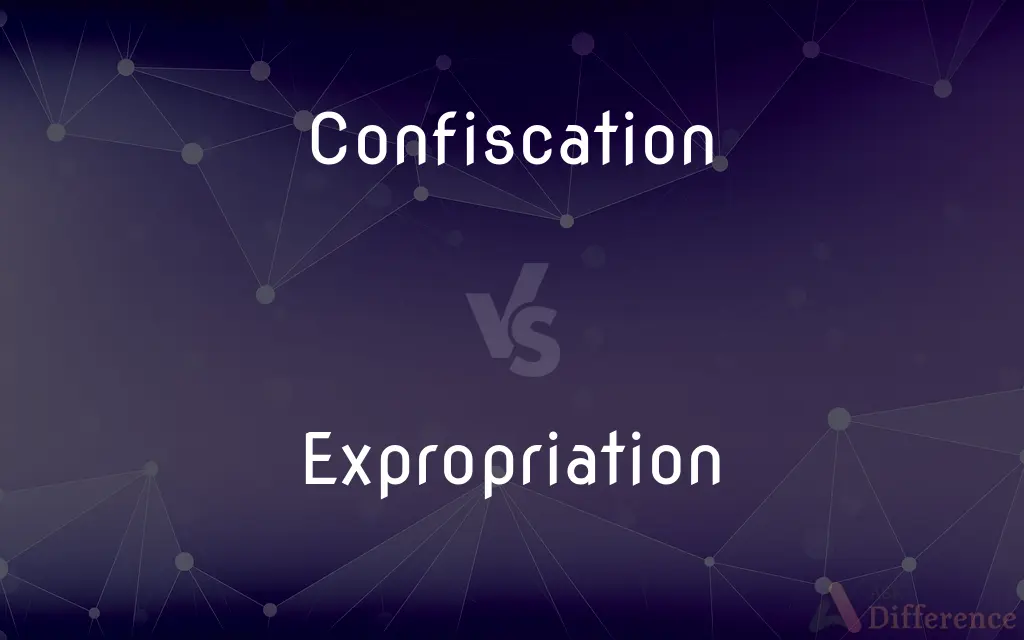Confiscation vs. Expropriation — What's the Difference?
Edited by Tayyaba Rehman — By Urooj Arif — Updated on April 15, 2024
Confiscation entails the government seizing property as a penalty, usually without compensation, whereas expropriation involves the state taking property for public use, typically with compensation.

Difference Between Confiscation and Expropriation
Table of Contents
ADVERTISEMENT
Key Differences
Confiscation is typically a punitive action taken by authorities against wrongdoing or illegal activities, where property is seized as a penalty. On the other hand, expropriation is generally executed for public benefit, such as for infrastructure projects or urban development.
In the case of confiscation, the original owner is not compensated because the action is punitive. Whereas in expropriation, compensation is usually provided to the owner to offset the loss of their property, reflecting its fair market value.
Confiscation can occur with minimal or no prior notice to the owner, reflecting its nature as a legal or penal measure. In contrast, expropriation often involves a legal process that includes notification, assessment, and the right to a hearing.
The legal basis for confiscation is often grounded in criminal law or regulations enforcing compliance. On the other hand, expropriation is based on laws that focus on land acquisition and urban planning, justified by the need for societal advancement.
Confiscation does not generally require the government to use the property for public benefit. However, expropriation is specifically intended for public use or societal development, ensuring that the taken property serves a broader public interest.
ADVERTISEMENT
Comparison Chart
Purpose
Punitive, for wrongdoing
Public use, societal benefit
Compensation
None
Provided, reflects fair market value
Legal Basis
Criminal law, compliance regulations
Land acquisition laws, urban planning
Process
Minimal or no notice, quick action
Involves notification, assessment, hearing process
Public Benefit
Not required
Required, for projects like roads, schools
Compare with Definitions
Confiscation
Forfeiture of property as a penalty.
His car was confiscated after repeated DUI offenses.
Expropriation
Government acquisition of private property for public use.
Land was expropriated for the new highway.
Confiscation
Government action against illicit gains.
Confiscated goods were auctioned by the state.
Expropriation
Requires justification of public interest.
The expropriation was justified by the new public park project.
Confiscation
Seizure of property by authority without compensation.
The jewelry was confiscated during the raid.
Expropriation
Often involves infrastructure and development.
Expropriated land facilitated the expansion of the airport.
Confiscation
Taking without prior notice or consent.
Authorities confiscated counterfeit products from the shop.
Expropriation
Compensation to owners for taken property.
Homeowners received fair compensation for expropriation.
Confiscation
Legal taking of assets due to law violations.
Assets acquired through fraud were confiscated.
Expropriation
Legal process involving fair market valuation.
Expropriation procedures assessed the land's value accurately.
Confiscation
Confiscation (from the Latin confiscare "to consign to the fiscus, i.e. transfer to the treasury") is a legal form of seizure by a government or other public authority.
Expropriation
To take (a property) for public use.
Confiscation
To seize (private property) for the public treasury, especially as a penalty for wrongdoing.
Expropriation
The act of expropriating; the surrender of a claim to private property; the act of depriving of private propriety rights.
Confiscation
To seize by authority
The teacher confiscated all the comic books we had in class.
Expropriation
The act of expropriating; the surrender of a claim to exclusive property; the act of depriving of ownership or proprietary rights.
The expropriation of bad landlords.
Confiscation
Seized by a government; appropriated.
Expropriation
Taking out of an owner's hands (especially taking property by public authority)
Confiscation
Having lost property through confiscation.
Confiscation
The act or process of confiscating.
Confiscation
The act or process of taking property or condemning it to be taken, as forfeited to the public use.
The confiscations following a subdued rebellion.
Confiscation
Seizure by the government
Common Curiosities
What are the legal grounds for expropriation?
Expropriation is legally grounded in public necessity, such as for infrastructure or urban planning.
How does confiscation differ from expropriation in terms of compensation?
Confiscation involves no compensation, while expropriation includes compensation based on fair market value.
What is expropriation?
Expropriation is when the state takes property for public use, typically offering compensation.
What is confiscation?
Confiscation is the government seizing property as a penalty, usually without compensation.
Can a property confiscated be used for personal use by the authorities?
Typically, confiscated property is not used for personal use but may be auctioned or used for public benefit.
What happens to confiscated property?
Confiscated property is typically retained by the state. It may be used for government purposes, destroyed if it's illicit, or auctioned off.
Can owners contest a confiscation or expropriation decision?
Owners can contest both, but the basis differs: in confiscation, the contestation would typically challenge the legality of the seizure; in expropriation, it might focus on the adequacy of compensation or the legality of the procedure.
Is there a legal process followed in both confiscation and expropriation?
In confiscation, the process is often swift, linked to legal penalties, and may not involve extensive hearings. In expropriation, a thorough legal process is mandatory, including public hearings and assessments.
Are there international laws regulating expropriation?
Yes, international laws and treaties often regulate expropriation, requiring that it be conducted for public purposes and with fair compensation.
What are typical examples of public use in expropriation cases?
Examples include building public infrastructures like highways, schools, or hospitals, and sometimes urban redevelopment projects.
Share Your Discovery

Previous Comparison
Contest vs. Tournament
Next Comparison
Turbofan vs. TurbopropAuthor Spotlight
Written by
Urooj ArifUrooj is a skilled content writer at Ask Difference, known for her exceptional ability to simplify complex topics into engaging and informative content. With a passion for research and a flair for clear, concise writing, she consistently delivers articles that resonate with our diverse audience.
Edited by
Tayyaba RehmanTayyaba Rehman is a distinguished writer, currently serving as a primary contributor to askdifference.com. As a researcher in semantics and etymology, Tayyaba's passion for the complexity of languages and their distinctions has found a perfect home on the platform. Tayyaba delves into the intricacies of language, distinguishing between commonly confused words and phrases, thereby providing clarity for readers worldwide.













































